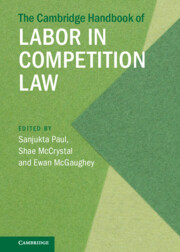Book contents
- The Cambridge Handbook of Labor in Competition Law
- The Cambridge Handbook of Labor in Competition Law
- Copyright page
- Contents
- Contributors
- Preface
- 1 Labor in Competition Law
- 2 Collective Labour Rights for Working People
- 3 Economic Coordination as Freedom of Association
- 4 The State’s Power to Govern in This Field Is Paramount: Antitrust, Labor, and the First Amendment
- 5 Competition Law as Collective Bargaining Law
- 6 Antitrust, Free Trade, and Fissuring
- 7 American Antitrust Exceptionalism
- 8 Competition and Labour Law in Canada
- 9 Workers and Competition Law in Japan
- 10 Workers and Competition Law in Australia
- 11 Workers and Competition Law in New Zealand
- 12 Competition Law and Labour Law
- 13 Workers and Competition Law in India
- 14 Competition and Labour Law in the United Kingdom
- 15 A Solution in Search of a Problem?
- 16 Competition and Labour Law in Germany
- 17 Labour Law and Competition Law Under French Regulation
- 18 Competition Law, Cartels and Collective Bargaining
- 19 The EU, Competition Law and Workers Rights
- 20 Is South American Collective Labor Law Confronted by Competition Law?
- 21 Conclusion
9 - Workers and Competition Law in Japan
Published online by Cambridge University Press: 05 May 2022
- The Cambridge Handbook of Labor in Competition Law
- The Cambridge Handbook of Labor in Competition Law
- Copyright page
- Contents
- Contributors
- Preface
- 1 Labor in Competition Law
- 2 Collective Labour Rights for Working People
- 3 Economic Coordination as Freedom of Association
- 4 The State’s Power to Govern in This Field Is Paramount: Antitrust, Labor, and the First Amendment
- 5 Competition Law as Collective Bargaining Law
- 6 Antitrust, Free Trade, and Fissuring
- 7 American Antitrust Exceptionalism
- 8 Competition and Labour Law in Canada
- 9 Workers and Competition Law in Japan
- 10 Workers and Competition Law in Australia
- 11 Workers and Competition Law in New Zealand
- 12 Competition Law and Labour Law
- 13 Workers and Competition Law in India
- 14 Competition and Labour Law in the United Kingdom
- 15 A Solution in Search of a Problem?
- 16 Competition and Labour Law in Germany
- 17 Labour Law and Competition Law Under French Regulation
- 18 Competition Law, Cartels and Collective Bargaining
- 19 The EU, Competition Law and Workers Rights
- 20 Is South American Collective Labor Law Confronted by Competition Law?
- 21 Conclusion
Summary
In Japan, the Labour Union Act (LUA) guarantees workers the right to associate, bargain collectively and go on strike and the Antimonopoly Act (AMA) does not apply to these actions. To determine whether individuals constitute workers under the LUA, the court assesses multiple factors such as whether they are integrated into a business organisation and if the contract terms are unilaterally decided by the employers. Once they fall outside the definition of workers, their practices fall within the scope of AMA to the extent that they carry out the business as enterprises. Only a practice that has an anticompetitive effect is deemed unlawful under the AMA. With the increase of self-employed workers, the distinction between employee (worker) and enterprise has become blurred. There is also no precedent which indicates how the anticompetitive effect would be examined under the AMA in the case of collective actions of a sole-trader and other microenterprises. Although the AMA exempts the actions of cooperatives, the cooperative may be ill-suited for the selfemployed. These legal environments create serious uncertainty, which may deter taking collective action in order to establish fair trading and working conditions
- Type
- Chapter
- Information
- The Cambridge Handbook of Labor in Competition Law , pp. 141 - 153Publisher: Cambridge University PressPrint publication year: 2022

